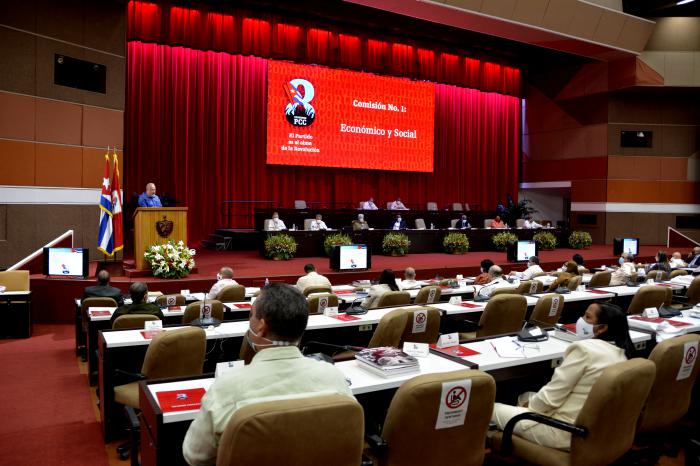Havana: We have not stopped in the search for solutions to current problems nor have we renounced future projects, so the National Plan for economic and social development has been drawn up until 2030 and progress is being made in the implementation of the Guidelines for the Economic and Social Policy, disseminates the digital version of the Granma newspaper.
When Army General Raúl Castro Ruz, in April 2010, assured that “the economic battle constitutes today, more than ever, the main task and the center of the ideological work of the cadres, because the sustainability and preservation of our social system”, the changes that the Cuban economy should undertake from now on were enunciated.
It was precisely on these transformations and the difficulties faced, this Friday, the analyzes of the delegates to the 8th Congress of the Communist Party of Cuba, belonging to commission 1, chaired by the prime minister, Manuel Marrero Cruz.
The exchanges were also attended by the members of the Political Bureau Esteban Lazo Hernández, president of the National Assembly of People’s Power and the Council of State; Salvador Valdés Mesa, Vice President of the Republic; Ramiro Valdés Menéndez, Deputy Prime Minister, and Ulises Guilarte de Nacimiento, Secretary General of the Federation of the Cuban Workers, among other Party and Government leaders.
Referring to the complex context that the country is going through, Marrero Cruz did not overlook the impact of the COVID-19 pandemic and the worsening of the blockade, accentuated by the more than 240 measures imposed by the United States, and articulated with a campaign to discredit the Revolution and the management of the Cuban Government.
However, despite the difficult scenario, he assured that we have not stopped in the search for solutions to current problems nor have we renounced future projects, therefore the National Plan for economic and social development has been drawn up until 2030, and progress is being made in the implementation of the Economic and Social Policy Guidelines.
The practical expression of these issues, he considered, lies in the approved socio-economic strategy, with 319 measures aimed at boosting the economy and containing the effects of the global crisis derived from the pandemic.
In 2021, the Prime Minister valued, the situation is no fewer complexes and, based on the experiences of 2020, priorities were established, among which the confrontation with COVID-19 stands out.
Having a strong health system, the work of Fidel, has allowed us, said Marrero Cruz, to implement the action plan and obtain positive results, thanks to the meritorious role of health personnel, scientists, young people and the people.
Despite this, the appearance of new strains with a higher level of transmission, together with the failure to comply with the established protocols, have made it difficult to control the current regrowth, and the main problems are located in the provinces of Pinar del Río, Havana, Matanzas, Sancti Spíritus, Granma and Santiago de Cuba, he asserted.
Obligatory mention had the five vaccine candidates developed by the Greater Antilles, two of them in phase III of clinical trials, with positive results. However, he warned, strict compliance with the procedures is what will allow us to control this situation that has left us unfortunate loss of human life and millionaire expenses.
ORDERING TASK, KEEP PREPARING THE WAY
Regarding the implementation of the Ordering Task, he reiterated that, as has already been reported, it creates more favorable conditions to advance in the solution of macroeconomic problems that impact the performance of the economy, and, as one of the positive impacts, he pointed out that more than 150,000 people have been interested in job offers.
However, he drew attention to some errors presented, both in design and in implementation, which have generated dissatisfaction in the population.
After analyzing the problems presented, he said that new legal norms have been issued, which are providing answers. In addition, he stressed that we will continue to make the necessary adjustments until we consolidate the implementation of the task and achieve the objectives for which it was designed.
Another issue addressed, due to its marked sensitivity, was food production. Agriculture, he acknowledged, does not achieve the productive levels necessary to satisfy the demands of the population, an issue that is not only a priority but, as the Army General stated, a matter of national security.
For this reason, he mentioned the measures recently approved, with the aim of increasing food production, of which 30 are considered a priority, and some of immediate implementation.
All of this, the Prime Minister asserted, “will allow us to achieve more efficient marketing, at fair prices, and to establish an improvement in the Cuban agricultural system, which guarantees sustained food production.”
Regarding the development of the different economic actors, he emphasized the unprecedented expansion of self-employment, which went from a small list of authorized activities to another of prohibited activities, thus opening up the possibility of carrying out several trade activities, within the same project, with a single license.
This measure, he stressed, will contribute to the search for solutions to unsatisfied demands of the population, with an impact on the recently approved local development policy.
It is then, in his opinion, that it be implemented well, which will require a great effort from the municipal authorities, who will be responsible for the processing, approval and control of the projects.
Likewise, he said, the final evaluation process of the errors presented in the experiment of non-agricultural cooperatives is underway, from which a gradual generalization of this form of management will be derived.
In addition, he reported, progress has been made in the study of micro, small and medium-sized enterprises, for which the policy was approved that provides for the participation of the state and private sector, and legal regulations are in the process of being drafted, which should be previously approved by the Political Bureau.
He stressed, in the same way, that these forms of management will always be a complement to the socialist state enterprise, which is the main subject of the national economy.
Precisely, with the objective of consolidating an innovative, efficient state business system that generates high-quality goods and services, 28 measures were approved, in a first stage, with the purpose of eliminating obstacles and granting more powers. These were joined by another 15, recently, whose regulations have already been signed by the Council of State.
Despite the provisions adopted, said Manuel Marrero, there are still shortcomings in the operation, so the measures provided and the ordinance put the socialist state company in similar conditions to the rest of the actors, and eliminate any excuse for it to perform. its role in the national economy.
The fundamental problem, according to Marrero Cruz, continues to be in the prices of basic products and services, tempered by a demand that is higher than the supply and dissatisfaction of workers in the lowest salary scales.
And, as an essential requirement, the implementation and maintenance of all these decisions demand, in the words of the Prime Minister, “capable cadres, with deep political-ideological convictions, with total confidence in the future and aware that revolutionaries, no matter how complex they may be. whatever the challenges, we will always grow ”.
OUTLINE THE COURSE OF THE NEXT FIVE YEARS
When referring to the work carried out by Commission No. 1, prior to the 8th. Congress, Manuel Marrero emphasized the analysis of the economic-social results achieved to date, and the projections to continue advancing.
The commission, he explained, was structured into three work teams that examined the documents that will be submitted to the delegates for approval, on which more than 360 opinions were issued.
• Status of implementation of the Guidelines of the Economic and Social Policy of the Party and the Revolution.
• Proposal to update the Conceptualization of the economic and social Model.
• Proposal to update the Guidelines for the period 2021-2026.
• Review of the economy during the 2016-2020 five-year period.
• The exchange sessions that preceded the great event, he considered, allowed updating and enriching the texts that, once adopted, will outline the course to be followed in the next five years.
BETWEEN ADVANCES AND CHALLENGES, THE CUBAN MODEL IS UPDATED
Alejandro Gil Fernández, Deputy Prime Minister and Head of Economy and Planning, was in charge of presenting the review of the main indicators and assessments of the national economy in the five-year period prior to the 8th Congress.
Meanwhile, Marino Murillo Jorge, member of the Political Bureau and head of the Permanent Commission for Implementation and Development, presenting to the commission the report on the status of the implementation of the Guidelines, which evaluates the work carried out since the 6th. Congress to date, based on the updating of the Cuban economic and social model, specified that, with respect to this document, 54 opinions were received regarding the approved policies.
In the context of the Update of the economic and social Model, 244 policies with different objectives, scopes and impacts have been approved. Of this total, 83 have been integrated, as they constitute updates to other policies, thus reducing them to 161, for the purposes of the evaluation.
The approved policies were grouped for evaluation into three categories. The first category: those that obtained positive results and achieved their objective; the second category: those that partially achieved their purpose, and the third category: those that, with negative derivations, did not achieve their purpose.
IN FIGURES:
• First category: 52 policies.
• Second category: 41 policies.
• Third category: 12 policies.
Not evaluated: 56 policies (as they have not been approved, or the legal norms that implement them, or have been made recently).
For its part, the degree of implementation of the 274 Guidelines approved in the 7th Congress was also appreciated. For the purposes of the analysis, 82 (30%) Guidelines were implemented, 109 (40%) are in the implementation process, 83 (30%) are in the proposal or approval stage, and none have not been implemented.
The implementation of the Ordering Task has contributed, to a great extent, to the advancement of the Update of the economic and social Model. This has impacted on 57 Guidelines, based on reviews carried out since the beginning of its execution and the progress of certain programs.
Some of the main achievements of the Ordering Task, in its initial moments, are exchange rate unification; the general reform of wages, pensions and benefits; the reduction of undue subsidies and gratuities as far as economic conditions have permitted; the increase in job search; the decentralization of powers for the formation of prices and their execution, based on the maximum limits defined and their transfer to the organizations, the business system and local governments; the beginning of the complex price correction process; greater demand from the population and some entities regarding the quality / price ratio of products and services; and the behavior of the exchange from CUC to CUP within what is foreseeable.
However, the Ordering Task has not been exempt from problems that negatively affect a large part of the Cuban population, among which were detected:
• Establishment of excessive prices, both by state entities and by other economic actors, which have impacted on the development of productive activity. They have also caused, actually or potentially, an impact on the purchasing power of a part of the population.
• Insufficiencies present in the state business system and other forms of production since before the Ordering Task, as well as tendencies to raise prices to mitigate them.
• Lack of correspondence between the quality levels of the products or services offered with the new established prices, which in many cases were subsidized and accepted, given their very low prices.
• Dissatisfaction with the new salaries and income and the changes in the payment methods.
• OVERCOME OBSTACLES TO THE IMPLEMENTATION OF THE GUIDELINES
During the debate generated around the content of the report, the delegates presented opinions and suggestions about crucial issues that influence the successful progress of the Update of the Cuban model.
One of the topics addressed was the one referred to the territorial development policy, on which Carlos César Torres Páez emphasized, invited by Pinar del Río, proposing that the progress made by the country in this matter be reflected in the document, given its impact on the socio-economic development of the territories.
Ana Teresa Igarza, delegate from Artemisa, pointed out as a deficiency the delay in the approval of the legal norms that implement policies. Regarding this point, Marrero Cruz acknowledged that this has been one of the obstacles that has had a negative impact on implementation, and asserted that work will be done so that the policies come to light with their respective legal regulations.
At the end of the debate, both reports presented for discussion were approved by the Commission’s member delegates.

Redacción Digital
Equipo de redactores del sitio web de Radio Mayabeque



